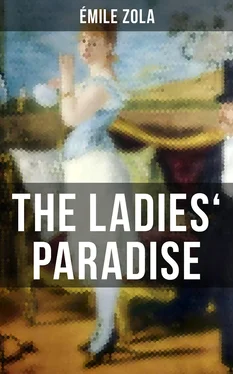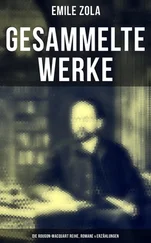“That’s my only pleasure, yawning in other’s faces,” said Vallagnosc, smiling with his cold look.
At this Mouret’s passion subsided, and he became affectionate again. “Ah, Paul, you’re not changed. Just as paradoxical as ever! However, we’ve not met to quarrel. Each one has his own ideas, fortunately. But you must come and see my machine at work; you’ll see it isn’t a bad idea. Come, what news? Your mother and sisters are quite well, I hope? And weren’t you supposed to get married at Plassans, about six months ago?”
A sudden movement made by Vallagnosc stopped him; and as the former was looking round the drawing-room with an anxious expression, Mouret also turned round, and noticed that Mademoiselle de Boves was closely watching them. Blanche, tall and stout, resembled her mother; but her face was already puffed out, her large, coarse features swollen with unhealthy fat. Paul, in reply to a discreet question, intimated that nothing was yet settled; perhaps nothing would be settled. He had made the young person’s acquaintance at Madame Desforges’s, where he had visited a good deal last winter, but where he very rarely came now, which explained why he had not met Octave there sooner. In their turn, the De Boves invited him, and he was especially fond of the father, a very amiable man, formerly well known about town, who had retired into his present position. On the other hand, no money. Madame de Boves having brought her husband nothing but her Juno-like beauty as a marriage portion, the family were living poorly on the last mortgaged farm, to which modest revenue was added, fortunately, the nine thousand francs a year drawn by the count as Inspector-General of the Stud. And the ladies, mother and daughter, kept very short of money by him, impoverished by tender escapades outside, were sometimes reduced to turning their dresses themselves.
“In that case, why marry?” was Mouret’s simple question.
“Well! I can’t go on like this forever,” said Vallagnosc, with a weary movement of the eyelids. “Besides, there are certain expectations; we are waiting the death of an aunt.”
However, Mouret still kept his eye on Monsieur de Boves, who, seated next to Madame Guibal, was most attentive, and laughing tenderly like a man on an amorous campaign; he turned to his friend with such a significant twinkle of the eye that the latter added:
“Not that one. At least not yet. The misfortune is, that his duty calls him to the four corners of France, to the breeding depots, so that he has continual pretexts for absenting himself. Last month, whilst his wife supposed him to be at Perpignan, he was living at an hotel, in an out-of-the-way neighborhood, with a music-mistress.”
There ensued a pause. Then the young man, who was also watching the count’s gallantries towards Madame Guibal, resumed in a low tone: “Really, I think you are right. The more so as the dear lady is not exactly a saint, if all they say is true. There’s a very amusing story about her and an officer. But just look at him! Isn’t he comical, magnetizing her with his eyes? The old-fashioned gallantry, my dear fellow! I adore that man, and if I marry his daughter, he can safely say it’s for his sake!”
Mouret laughed, greatly amused. He questioned Vallagnosc again, and when he found that the first idea of a marriage between him and Blanche came from Madame Desforges, he thought the story better still. That good Henriette took a widow’s delight in marrying people, so much so, that when she had provided for the girls, she sometimes allowed their fathers to choose friends from her company; but all so naturally, with such a good grace, that no one ever found any food for scandal. And Mouret, who loved her with the love of an active, busy man, accustomed to reducing his tenderness to figures, forgot all his calculations of captivation, and felt for her a comrade’s friendship.
At that moment she appeared at the door of the little drawing-room, followed by a gentleman, about sixty years old, whose entry had not been observed by the two friends. Occasionally the ladies’ voices became sharper, accompanied by the tinkling of the small spoons in the china cups; and there was heard, from time to time, in the interval of a short silence, the noise of a saucer laid down too roughly on the marble table. A sudden gleam of the setting sun, which had just emerged from behind a thick cloud, gilded the top of the chestnut-trees in the gardens, and streamed through the windows in a red, golden flame, the fire of which lighted up the brocatel and brass-work of the furniture.
“This way, my dear baron,” said Madame Desforges. “Allow me to introduce Monsieur Octave Mouret, who is longing to express the admiration he feels for you.” And turning round towards Octave, she added: “Baron Hartmann.”
A smile played on the old man’s lips. He was a short, vigorous man, with a large Alsatian head, and a heavy face, which lighted up with a gleam of intelligence at the slightest curl of his mouth, the slightest movement of his eyelids. For the last fortnight he had resisted Henriette’s wish that he should consent to this interview; not that he felt any immoderate jealousy, accepting, like a man of the world, his position of father; but because it was the third friend Henriette had introduced to him, and he was afraid of becoming ridiculous at last. So that on approaching Octave he put on the discreet smile of a rich protector, who, if good enough to show himself charming, does not consent to be a dupe.
“Oh! sir,” said Mouret, with his Southern enthusiasm, “the Crédit Immobilier’s last operation was really astonishing! You cannot think how happy and proud I am to know you.”
“Too kind, sir, too kind,” repeated the baron, still smiling.
Henriette looked at them with her clear eyes without any awkwardness, standing between the two, lifting her head, going from one to the other; and, in her lace dress, which revealed her delicate neck and wrists, she appeared delighted to see them so friendly together.
“Gentlemen,” said she at last, “I leave you to your conversation.” Then, turning towards Paul, who had got up, she resumed: “Will you accept of a cup of tea, Monsieur de Vallagnosc?”
“With pleasure, madame,” and they both returned to the drawing-room.
Mouret resumed his place on the sofa, when Baron Hartmann had sat down; the young man then broke out in praise of the Crédit Immobilier’s operations. From that he went on to the subject so near his heart, speaking of the new thoroughfare, of the lengthening of the Rue Reaumur, of which they were going to open a section under the name of the Rue du Dix-Décembre, between the Place de la Bourse and the Place de l’Opera. It had been declared a work of public utility eighteen months previously; the expropriation jury had just been appointed. The whole neighborhood was excited about this new opening, anxiously awaiting the commencement of the work, taking an interest in the condemned houses. Mouret had been waiting three years for this work—first, in the expectation of an increase of business; secondly, with certain schemes of enlargement which he dared not openly avow, so extensive were his ideas. As the Rue du Dix-Décembre was to cut through the Rue de Choiseul and the Rue de la Michodière, he saw The Ladies’ Paradise invading the whole block, surrounded by these streets and the Rue Neuve-Saint-Augustin; he already imagined it with a princely frontage in the new thoroughfare, lord and master of the conquered city. Hence his strong desire to make Baron Hartmann’s acquaintance, when he learnt that the Crédit Immobilier had made a contract with the authorities to open and build the Rue du Dix-Décembre, on condition that they received the frontage ground on each side of the street.
“Really,” repeated he, trying to assume a naïve look, “you’ll hand over the street readymade, with sewers, pavements, and gas lamps. And the frontage ground will suffice to compensate you. Oh! it’s curious, very curious!”
Читать дальше












